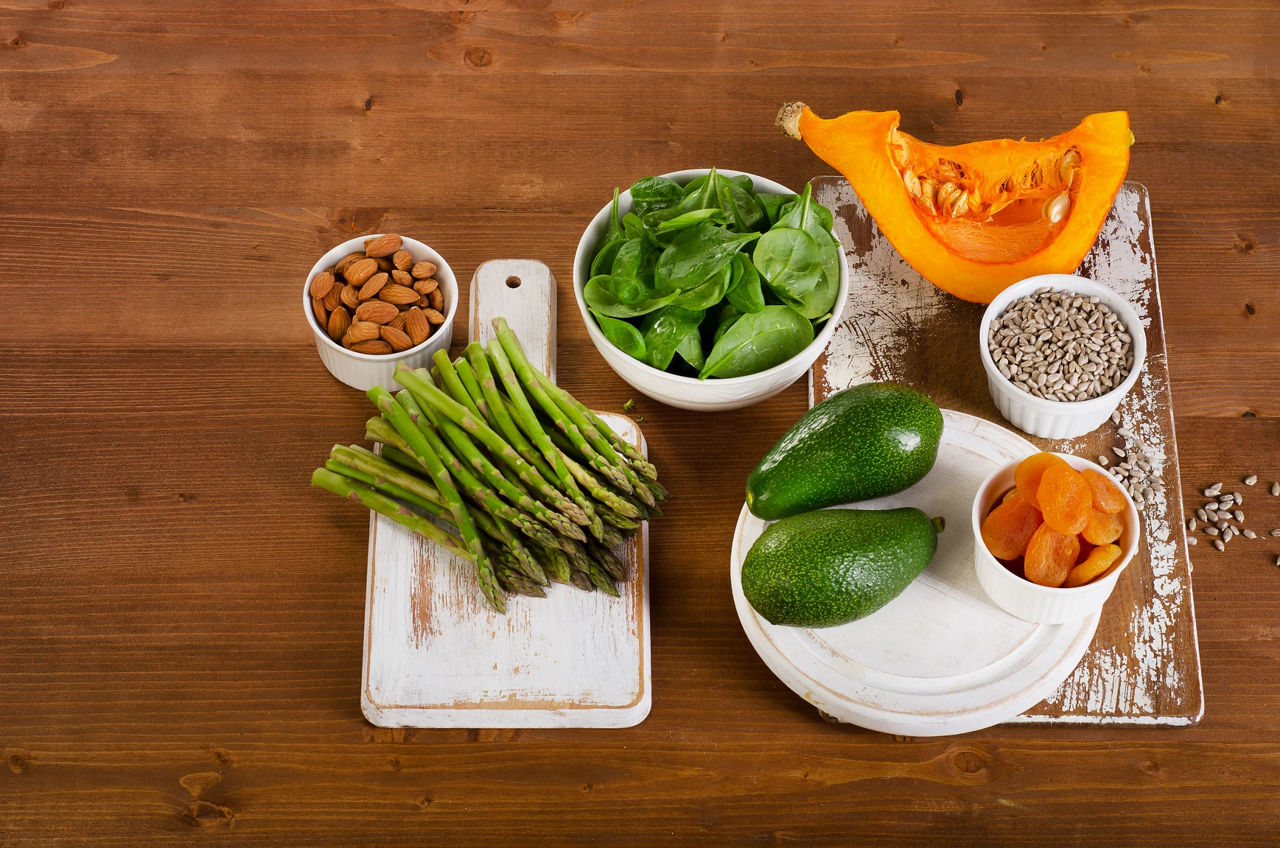Read time: 3 minutes
Vitamin A in pregnancy
Vitamin A (also known as retinol) is very important for both you and your baby during pregnancy. Not only does it help strengthen the immune system and support its function properly, but it also helps to maintain healthy skin and good vision1. However, too much vitamin A in pregnancy can be harmful to your unborn baby, so it’s important that you’re getting just the right amount as part of a healthy pregnancy diet.
Here we’re exploring the benefits of vitamin A in pregnancy, how much you need, and which foods can help you to get just enough.

Why is vitamin A so important during pregnancy?
Getting the right amount of vitamin A in pregnancy has several benefits for both you and your baby. Firstly, it contributes to the development of one of the most intricate and extraordinary parts of your baby’s body – their eyes2.
Vitamin A in pregnancy contributes to healthy immune system function, foetal development and growth2, 3. It can also support the health and function of your baby’s organs, for example the lungs in cases of vitamin A deficiency, helping to develop the millions of tiny air sacs, called alveoli. These allow oxygen to transfer into the blood, and carbon dioxide to transfer back out4.
Infants are born with low stores of vitamin A3, and will get the rest of the vitamin A they need from external sources such as formula milk or breast milk. This is why it’s important to explore and maintain a healthy breastfeeding diet.
How much vitamin A do you need when you’re pregnant?
Getting the right amount of vitamin A while pregnant is a bit of a balancing act. Too much can harm your developing baby and lead to birth defects, while too little carries certain risks to you and your baby’s development. A healthy intake will ensure that your baby gets the nutritional support they need for normal growth and development.
Pregnant women need a little more vitamin A in pregnancy than they usually would5. The daily RNI of vitamin A for pregnant women is 700 micrograms, which is 100 micrograms more than for the average female adult6. To put this into context, half a cup of raw carrots contains 459 micrograms of vitamin A, and half a cup of broccoli contains 60 micrograms of vitamin A7.
There’s no reason why you can’t get all the vitamin A you need from the foods you eat in your diet, although you don’t need a supply of it every day. This is because vitamin A is a fat-soluble vitamin that your body can build up stores of in your liver. As such, any vitamin A your body doesn’t use straight away is stored away to be used in the future8.
While a healthy intake of vitamin A is important throughout your pregnancy, your risk of deficiency is higher during your third trimester, when requirements increase due to your baby’s accelerated development and increased blood volume. During pregnancy, your body naturally prioritises your baby’s needs, which is why you need more9.

Why too much vitamin A can be bad during pregnancy
You may have heard your doctor or midwife talk about some of the foods that you should avoid, some of which on the basis that they contain too high levels of vitamin A. But why is vitamin A bad in pregnancy?
Too much vitamin A can be harmful to your baby during pregnancy, causing damage to the development of their nervous system10. As such, pregnant women (and those who are planning to have a baby) are advised against eating certain foods that contain high doses of vitamin A such as liver, and all liver products, for example pâté8.
The current advice from the NHS is that it’s not recommended for pregnant women to take doses of vitamin A via a supplement11, or to take other supplements that are high in vitamin A such as cod liver or fish liver oil8. If you intend to take a prenatal supplement, or multivitamins, be sure to check how much vitamin A these contain, and always speak to your doctor or midwife to ensure that it’s safe to take during your pregnancy.
What happens if you don’t get enough vitamin A in pregnancy?
Vitamin A deficiency is the leading cause of blindness across the globe12, so whilst too much vitamin A in pregnancy can be harmful, it’s important that you get just the amount that you need.
Vitamin A plays a vital role during pregnancy, and some studies have shown that low levels can result in birth defects12, as well as affecting the development of your baby’s immune function after birth, leaving them more susceptible to infection and illness13.
Which foods contain Vitamin A?
Vitamin A is found in dairy foods, oily fish and some fruit and vegetables. It comes in two forms; retinol and beta-carotene.
Retinol is a form of vitamin A that comes from animal-derived foods14, such as1:
- Cheese
- Eggs (you can read more about eating eggs in pregnancy here)
- Dark leafy green vegetables such as spinach
Vitamin A is also found in liver and liver products, but as discussed above, you’re advised against consuming these products during pregnancy.
You can also include foods containing beta-carotene into your diet. Beta-carotene is a plant pigment and natural antioxidant that the body converts into Vitamin A15. Good sources of beta-carotene include orange-coloured fruits and vegetables such as8:
- Carrots
- Butternut squash
- Melon
- Apricots
- Sweet potato
- Red peppers
Try increasing your intake with these vitamin A-rich snacks and meals:
How to make sure you’re getting all the correct vitamins you need
The best way for you to get all the nutrients, vitamins and minerals that you need during your pregnancy is by eating a healthy, balanced diet containing a wide variety of different foods.
Some supplements aren’t safe to use during pregnancy, such as cod liver oil, or any supplement that uses fish liver oil, as these can be harmful to your growing baby15. However, there are some vitamins that are very important for your baby’s growth and development during pregnancy, and as such the NHS recommends that you should take the following supplements16:
Folic acid - you should take 400 micrograms of folic acid every day. This should start prior to your pregnancy if you’re planning to have a baby, and should continue until you’re 12 weeks pregnant.
Vitamin D - you should take 10 micrograms between September and March when the amount of sunlight we get is limited.
You might be thinking about taking some prenatal vitamins, or you may well be taking multivitamins daily. To be on the safe side, and to ensure that you’re getting the right amount of each vitamin that you need, it’s always a good idea to speak with your doctor or midwife before doing so in pregnancy.
related articles
Read next

Need some help?
You can get quick answers to common questions in our FAQs.
Alternatively, if you need help with general pregnancy or baby advice, or maybe on using or ordering our products - our expert team are always on hand to talk about feeding your baby.
- British Nutrition Foundation. Vitamins and minerals in a healthy diet [online] Available at https://www.nutrition.org.uk/healthy-sustainable-diets/vitamins-and-minerals/
- National Institutes of Health. Vitamin A and Carotenoids - Fact Sheet for Consumers [online] 2022. Available at https://ods.od.nih.gov/factsheets/VitaminA-Consumer/#:~:text=Vitamin%20A%20is%20important%20for,fruits%20and%20vegetables%20their%20color. [Accessed November 2023]
- WHO, Vitamin A supplementation during pregnancy, 2023 [Online]. Available at: https://www.who.int/tools/elena/interventions/vitamina-pregnancy [Accessed December 2023]
- Checkley W, West KP Jr, Wise RA, Baldwin MR, Wu L, LeClerq SC, Christian P, Katz J, Tielsch JM, Khatry S, Sommer A. Maternal vitamin A supplementation and lung function in offspring. N Engl J Med. 2010 May 13;362(19):1784-94. doi: 10.1056/NEJMoa0907441. Erratum in: N Engl J Med. 2010 Aug 19;363(8):798. Erratum in: N Engl J Med. 2010 Dec 30;363(27):2674. PMID: 20463338
- Bastos Maia S, Rolland Souza AS, Costa Caminha MF, Lins da Silva S, Callou Cruz RSBL, Carvalho Dos Santos C, Batista Filho M. Vitamin A and Pregnancy: A Narrative Review. Nutrients. 2019 Mar 22;11(3):681. doi: 10.3390/nu11030681. PMID: 30909386; PMCID: PMC6470929
- British Journal of Midwifery. Vitamin supplementation and nutrition during pregnancy and breastfeeding [online] 2015. Available at https://www.britishjournalofmidwifery.com/content/clinical-practice/vitamin-supplementation-and-nutrition-during-pregnancy-and-breastfeeding. [Accessed November 2023]
- Committee on Toxicity. Statement on the effects of excess Vitamin A on maternal health Appendix 1: Vitamin A content of foods, fortified food products and supplements [on;one] 2022. Available at https://cot.food.gov.uk/Appendix%201%3A%20%20Vitamin%20A%20content%20of%20foods%2C%20fortified%20food%20products%20and%20supplements. [Accessed December 2023]
- NHS. Vitamin A-Vitamins and minerals [online] 2022. Available at https://www.nhs.uk/conditions/vitamins-and-minerals/vitamin-a/. [Accessed November 2023]
- Radhika MS, Bhaskaram P, Balakrishna N, Ramalakshmi BA, Devi S, Kumar BS. Effects of vitamin A deficiency during pregnancy on maternal and child health. BJOG. 2002 Jun;109(6):689-93. doi: 10.1111/j.1471-0528.2002.01010.x. PMID: 12118649
- NHS Royal College of Obstetricians and Gynaecologists. Healthy eating and vitamin supplements in pregnancy [online] 2015. Available at https://www.bfwh.nhs.uk/wp-content/uploads/2015/08/healthy-eating-vit-suppl-preg.pdf. [Accessed November 2023]
- NHS Kingston Hospital. Nutrition and Weight in Pregnancy [online] 2023. Available at https://kingstonhospital.nhs.uk/information/nutrition-and-weight-in-pregnancy/. [Accessed November 2023]
- Bastos Maia S, Rolland Souza AS, Costa Caminha MF, Lins da Silva S, Callou Cruz RSBL, Carvalho Dos Santos C, Batista Filho M. Vitamin A and Pregnancy: A Narrative Review. Nutrients. 2019 Mar 22;11(3):681. doi: 10.3390/nu11030681. PMID: 30909386; PMCID: PMC6470929
- Azaïs-Braesco V, Pascal G. Vitamin A in pregnancy: requirements and safety limits. Am J Clin Nutr. 2000 May;71(5 Suppl):1325S-33S. doi: 10.1093/ajcn/71.5.1325s. PMID: 10799410
- McEldrew EP, Lopez MJ, Milstein H. Vitamin A. 2023 Jul 10. In: StatPearls [Internet]. Treasure Island (FL): StatPearls Publishing; 2023 Jan–. PMID: 29493984
- Drugs and Lactation Database (LactMed®) [Internet]. Bethesda (MD): National Institute of Child Health and Human Development; 2006–. Beta-Carotene. 2022 Sep 19. PMID: 30000966
- NHS. Vitamins, supplements and nutrition in pregnancy [online] 2023. Available at https://www.nhs.uk/pregnancy/keeping-well/vitamins-supplements-and-nutrition/. [Accessed November 2023]
Last reviewed 18th April 2024
Authored by Bahee Van de Bor




